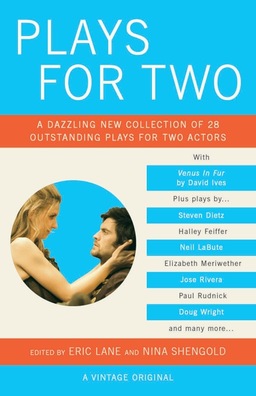|
I was overjoyed to learn that my play, Finals, Touchdowns, and Barrel Kicks, had been selected for publication in Eric Lane and Nina Shengold's latest anthology. Plays for Two is a unique anthology of twenty-eight terrific plays for two actors, by a mix of celebrated playwrights and cutting-edge new voices. I had the pleasure to speak with Eric Lane about his career as an editor and experiences as a playwright.  JACQUELINE LAWTON: Why did you decide to get into theatre? Was there someone or a particular show that inspired you? ERIC LANE: As a teenager, reading A Raisin in the Sun was an incredibly powerful experience. The play’s characters, story, range of emotion, strength and beauty all affected me very deeply. That piece still holds an incredible power today. JL: Plays for Two is your thirteenth anthology. Tell us about how you became an editor. EL: Nina was editing her second anthology, and in the middle of the project, she got hired to write a TV show. We were friends, both playwrights, and she asked me to step in and complete the book. We quickly discovered we really enjoyed working together. Plays for Two is now our 13th collaboration. JL: What is the process of editing a book? How do you determine the themes? How do you decide which of monologues, scenes and plays will be included? EL: Nina and I will come up with the theme for the book (e.g. Plays for Two, Plays for Actresses, Short Comic Plays, etc.). Many times the theme will emerge from trends we’re seeing in theater, or it may be a book we ourselves have always wanted to see. Over the years, we’ve developed an extensive network of playwrights, theaters, literary managers, agents and friends to whom we’ll reach out for new work. And the list is always growing. On average, we’ll read between 400-500 submissions for a collection. A lot of factors go into choosing the material for the book. Not only are we seeking wonderful plays that fit our subject, but the plays should work together to create a full, interesting, diverse contemporary collection with a broad range of strong roles for actors. In total, our books for Vintage and Viking-Penguin have sold over 400,000 copies. Drama Book Shop once told us, “Your books are the most shoplifted titles in our store.” That really made us laugh. JL: What do you find most rewarding about being an editor? Do you have a surprising or interesting experience to share? EL: As editors, we read submissions hoping they'll be terrific. There’s a real joy in discovering wonderful new work. When a play is great, it jumps off the page from the moment you start reading it. You can feel it from the first stage direction or line of dialogue. That’s incredibly exciting. JL: In addition to your work as an editor, you are also a playwright. Tell me a little bit about your writing process. Do you have any writing rituals? Do you write in the same place or in different places? EL: My writing process changes with each play. Just when I think I know how I write a play, it’ll be completely different the next time. I always try to honor where I am at the moment and follow where the characters and story lead me. JL: Describe for me all the sensations you had the first time you had one of your plays produced and you sat in the audience while it was performed ... what was different about the characters you created? How much input did you have in the directing of that work? EL: The first time a play of mine was performed in New York City, it was an out of body experience. I knew the actors were speaking in English, I knew I spoke English and had written the play, and yet I literally couldn’t understand a word they were saying. Over the years, I’ve gotten much better. JL: What advice do you have for up-and-coming playwrights? EL: Editing these anthologies has taught me a lot as a playwright. One of the most important lessons I’ve learned is not to take rejection that personally. You may have written a brilliant play, but it may not match what that editor or theater is looking for at that particular moment. They already may have chosen another play that is somewhat similar. Or they just may not like it. I’m not saying don’t get pissed off when your work is rejected. But it’s important to use that anger or disappointment to fuel you in finding the right place for your work. Also, be smart about what you send in. For example, an agent recently submitted a full-length drama for an anthology of short comic plays. Bad idea. And if an editor asks for two plays maximum, don’t send in three. It just makes them cranky. Try to think of it from the point of view of the person reading your submission. If they’re reading over 500 plays, your play needs to stand out in some way – its use of language, humor, depth of emotion, originality, characters, story, setting, theatricality, skill, etc. Be original. If there’s another playwright whose work you love, don’t imitate them, but use their originality to inspire you to find your own unique voice. And most of all, hang in there. JL: What next for you? Where can we follow your work? EL: It has been a very full and creative time for me. My new play commission Filming O’Keeffe premiered at the Adirondack Theatre Festival this past summer in a beautiful production. This fall, I had a workshop of Floating at Raven Theatre in Chicago. Soon I’ll be starting rewrites on a new play. And when Plays for Two comes out in March, Nina and I promised to take each other out for a really nice lunch. www.ericlanewrites.com About Plays for Two
0 Comments
Your comment will be posted after it is approved.
Leave a Reply. |
My BlogI'm a playwright, dramaturg, and teaching artist. It is here where you'll find my queries and musings on life, theater and the world. My posts advocate for diversity, inclusion, and equity in the American Theatre and updates on my own work. Please enjoy!
Categories
All
Archives
June 2020
Reading List
|

